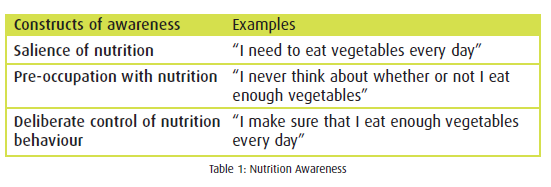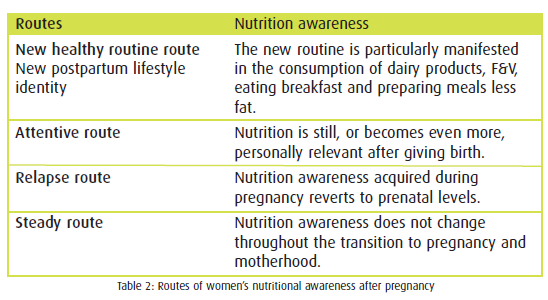Nutrition awareness of dutch women before, during and after pregnancy
An adequate nutrition pattern is of major importance for one’s health and well-being, especially during pregnancy when a woman undergoes major biological, physical, psychological and social transformations. It is likely to be one of the few critical periods in life when women are able to change health-related behaviours that are difficult to modify at other times. In the literature, this phenomenon has been introduced as the “Life Course Perspective” (LCP).
The two studies that we describe below are intended to provide a greater understanding of the LCP in relation to nutrition behavior and pregnancy and postpartum.
Nutrition awareness before and throughout
different trimesters in pregnancy – Quantitative study
The purpose of the first study1 is to examine cross-sectionally the nutrition awareness of women before and during pregnancy in order to provide a greater understanding of the LCP in relation to nutrition behavior and pregnancy. The sample consisted of five groups each of 100 Dutch nulliparous women:
- women who did not wish to become pregnant in the following year;
- women who had stopped using contraceptives in order to become pregnant; and
- women in their first, second and third trimester of pregnancy. The conceptualization of “nutrition awareness” developed for this study was based on three constructs of awareness derived from integrated theory (Table 1).

These three constructs were applied to each of the nine nutrition topics singled out by the Dutch Nutrition Centre: healthy eating, fruits and vegetables (F&V), bread, dairy, calorie intake, saturated and unsaturated fats, soft drinks, breakfast.
The importance of healthy nutrition as a lifestyle factor
Data analysis showed that all groups of women perceived unhealthy nutrition as the third most important factors (after excessive alcohol consumption and smoking) and more important than little physical exercise, stress and bad hygiene.
The highest nutrition awareness on pregnant women
Significant differences in scores on the nine nutrition-related areas between the five groups were found for F&V, dairy and calorie intake. The group of women not trying to conceive had the lowest nutrition awareness score, followed by the group of women trying to conceive and then the pregnant group. Data showed that there were no significant differences in nutrition awareness among the three trimester groups in pregnancy. Women not trying to conceive had significant lower nutrition awareness than women in their second and third trimester of pregnancy.
Nutrition awareness and motivations after pregnancy – Qualitative study
The purpose of the second study2 is to explore postpartum nutrition awareness and to explore the associated motivations for it. The sample consisted of 30 women between two and four months postpartum (breastfeeding/bottle-feeding) and 15 women between 10 and 14 months postpartum. Nutrition awareness was operationalized by asking them about saliency, pre-occupation with, and supervision of, nutrition and nutrition behaviours and they were asked how they felt about this compared to earlier phases in their lives.
The results of analyses of the interviews suggest that over time (throughout the first three to four months and first postpartum year) intensity shifts in nutrition awareness occurred. Women’s nutritional awareness in the postpartum period could be adequately categorized into four different routes (Table 2):

The existence of the new routine route and the attentive route provide indications in favor of the LCP, whereas the relapse route and the steady route do not.
Nutrition awareness in relation to motivations for nutrition behavior
Motivations for women’s choice of routes include feelings of responsibilities accompanying pregnancy and motherhood, a lack of energy and the wish to regain old weight and shape.
These motivations vary in extent of autonomy and in character. Generally, women who are more nutritionally aware as a result of pregnancy or who see motherhood as a new beginning for healthy life practices (in order to set an example for the child) are more highly autonomously motivated than women who are more aware of their nutrition because of breastfeeding practices or those wanting to lose maternal weight.
The interviews suggest that throughout the first postpartum year three shifts in nutrition awareness and types of motivations took place:
- as time elapsed, women who were/had been breastfeeding their child generally became more relaxed and the nutritional restrictions became less personally relevant;
- after about four months, other things in life became more important again: women resumed normal life and nutrition became part of a daily routine;
- when the child began to eat the same dinner as the rest of the family, women generally became more attentive to their nutrition in relation to health.
Pregnancy and postpartum: important condition for rethinking nutrition habits
Health practitioners should:
- Realize that pregnancy and postpartum can indeed be life transitions, triggering a woman to become more nutritionally aware – something that is difficult to modify at other times. This provides a window of opportunity for the promotion of healthy nutrition of which we need to make more use. Until now, health promotion literature directed at mothers is still mainly focused on improving breastfeeding practices and nutritional restrictions.
- Be aware of the fact that women are driven by different motivations to become more or less involved in their nutrition.
- Bear in mind that autonomous types of motivation for healthy nutrition behavior are more likely to have longer lasting effects.
References
- Szwajcer EM et al. Nutrition awareness before and throughout different trimesters in pregnancy: a quantitative study among Dutch women. Family Practices 2012; 29:i82-i88
- Szwajcer EM et al. Exploring nutrition awareness and motivations for nutrition behavior of Dutch primiparous mothers: consequences for the life course perspective. April 2007 Internal document, part of the project of Ellen Szwajcer`s PhD-Thesis (Wageningen University, 11 th September 207): Pregnancy: time for a new beginning. Exploring opportunities and challenges for healthy nutrition promotion.
